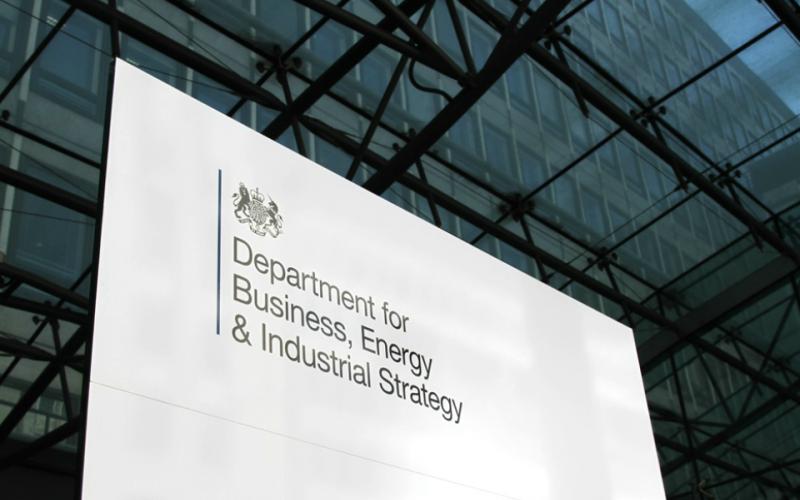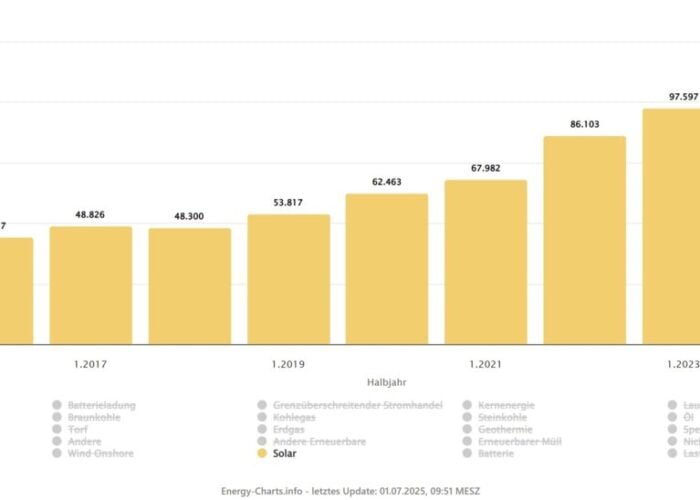
The UK government has committed to a major ramp-up of solar capacity in the country as part of a new energy strategy.
Unveiled today, the ‘British Energy Security Strategy’ is in response to increasing energy price volatility that has been exacerbated by Russia’s invasion of Ukraine. It includes a suite of measures and new targets for generation technologies designed to see Britain derive as much as 95% of its power from low carbon sources by the end of this decade.
Unlock unlimited access for 12 whole months of distinctive global analysis
Photovoltaics International is now included.
- Regular insight and analysis of the industry’s biggest developments
- In-depth interviews with the industry’s leading figures
- Unlimited digital access to the PV Tech Power journal catalogue
- Unlimited digital access to the Photovoltaics International journal catalogue
- Access to more than 1,000 technical papers
- Discounts on Solar Media’s portfolio of events, in-person and virtual
Amongst plans to significantly ramp up the capacity of the country’s nuclear and offshore wind portfolio, the strategy also states the UK’s intent to increase its existing 14GW capacity of solar PV, indicating that this could grow “up to five times” by 2035.
Such an increase would see the UK’s solar capacity reach 70GW, which trade body Solar Energy UK said had the potential to support up to 60,000 industry jobs.
In order to achieve this, the government has said it will consult on the rules for solar projects, with a specific focus on residential and commercial rooftop installations.
The full strategy, published today, commits the government to consulting on changes to planning laws in the UK which will “strengthen policy in favour of development” on non-protected land – i.e. land of low agricultural value and non-greenbelt sites – however, environmental protections are to remain in place.
The document also states the government will incentivise rooftop solar by “radically simplifying” planning processes relating to permitted development rights, with further considerations regarding the “best way to make use of public sector rooftops”.
The last time permitted development rights in the UK were amended for rooftop solar was in 2015, when the threshold for permitted development for such installations was raised from 50kWp to 1MWp. Permitted development rights allow projects to proceed without formal planning permission from local planning authorities, essentially streamlining the planning process.
At the time of writing, no specific consultations have been published by the country’s Department for Business, Energy and Industrial Strategy (BEIS). A BEIS spokesperson could not provide further detail regarding the consultations when contacted by PV Tech.
Previous reports had suggested that the government was to set a specific target for solar PV deployment of up to 50GW by 2030 – the country’s solar industry has repeatedly called for a target of 40GW by the same date to be set in place by the government – however the document has also been repeatedly delayed by rumoured disagreements within Prime Minister Boris Johnson’s cabinet.
Nevertheless, Johnson has trumpeted the energy strategy today. “We’re setting out bold plans to scale up and accelerate affordable, clean and secure energy made in Britain, for Britain – from new nuclear to offshore wind – in the decade ahead,” Prime Minister Boris Johnson said.
But the strategy has been widely criticised for lacking in specific detail and failing to tackle areas considered critical to any future energy strategy, such as demand side response and domestic insulation.
UK policy thinktank IPPR dismissed the strategy as a “recipe for failure”. “This plan should have been a route map for the UK to make significant progress towards a more affordable, secure, and clean energy future, but from what we’ve seen so far, it falls short on every test,” IPPR associate director for energy and climate, Luke Murphy, said.
Alice Bell, co-director at lobby group Possible, also noted that the number of solar jobs promised to be created over the rest of this decade is less than the number of jobs the industry lost in 2016, after the Conservative government of the time instituted major cuts to subsidy support.
“The promise of 10,000 solar jobs in six years is hard to stomach when it was only six years ago that the Solar Trade association were lamenting the 12,500 jobs that the Cameron government slashed in just a year. Cameron and Osborne managed to slash 12,000 solar jobs in a year, now Johnson and Sunak are saying they’ll make 10,000 in six? It’s hardly the visionary energy policy we’re looking for from the Prime Minister,” Bell said.
UK trade body the Association for Renewable Energy and Clean Technology also criticised the strategy as “wholly inadequate”, with CEO Nina Skorupska stating the government had “failed to rise to the challenge facing the country”.







